|
|
|
Sort Order |
|
|
|
Items / Page
|
|
|
|
|
|
|
| Srl | Item |
| 1 |
ID:
092465


|
|
|
|
|
| Publication |
2009.
|
| Summary/Abstract |
The use of force in international relations by the West is increasingly witnessing a greater reliance on Special Forces. This trend has profound implications for state action because Special Forces represent a very different kind of soldier and they possess the inherent ability to transgress traditional boundaries in peace and war. The development and participation of UK Special Forces in the Global War on Terror provides a microcosm of the positive and negative dimensions of using secret military units as the force of choice against insurgents and terrorists in Afghanistan, Iraq and indeed on the streets of London.
|
|
|
|
|
|
|
|
|
|
|
|
|
|
|
|
| 2 |
ID:
091802
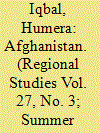

|
|
|
|
|
| Publication |
2009.
|
| Summary/Abstract |
Many problems that Afghanistan faces today are rooted in the legacy of its relationship with the international community. Weaknesses in governance, poor institution-building, absence of democracy, problems relating to its role in the war against terror and lack of accountability in foreign aid usage are some.
|
|
|
|
|
|
|
|
|
|
|
|
|
|
|
|
| 3 |
ID:
102957
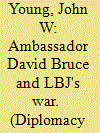

|
|
|
|
|
| Publication |
2011.
|
| Summary/Abstract |
Recent decades have seen growing historical interest in "second rank" officials who, whilst they do not play a leading role in government or political movements, can influence the way decisions are shaped and executed. At the same time, the interest of scholars in American policy during the Vietnam War shows no signs of abating. This article investigates the experience of one second rank official during the war, David Bruce, who was Ambassador to London during 1961-1969. Making particular use of Bruce's extensive diaries, it traces his shifting views on the war, looks at the extent to which he shared the outlook of other official,s and asks what influence, if any, he had on events. It argues that, whilst he always remained loyal to his own government and often mirrored the outlook of the Johnson Administration, Bruce had his own perspective on events, was consistently critical of American tactics on the ground, and, in Spring 1967, influenced by Robert McNamara, became an early advocate of retrenchment.
|
|
|
|
|
|
|
|
|
|
|
|
|
|
|
|
| 4 |
ID:
115055
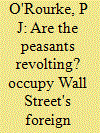

|
|
|
|
|
| Publication |
2012.
|
| Summary/Abstract |
Occupy Wall Street (and This, That, and the Other Place) might seem, at first video streaming glance, to be singular among protest movements. But-with its vaporous ends and its grounded means-"Occupy" is recognizable as yet another outbreak in history's long list of peasant revolts.
|
|
|
|
|
|
|
|
|
|
|
|
|
|
|
|
| 5 |
ID:
155473
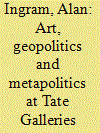

|
|
|
|
|
| Summary/Abstract |
Art galleries and museums have often been considered as sites at which the international and the political are both enacted and reworked. But how exactly does art ‘do’ geopolitics? Taking existing work on art and geopolitics in the gallery and museum as its departure point, this article advances a specific conceptual argument for how art does geopolitics that connects thinking in this area with broader debates in aesthetics and politics. Building on Jacques Rancière’s account of art as a dispositif, it explores the aesthetic politics – or metapolitics – through which artistic interventions have raised questions of oil within the Tate Galleries in London. Drawing out its ambiguities as well as potential critical implications, the article illustrates distinct ways in which the metapolitics of art may be activated via a discussion of The Robinson Institute, 2012, and of a series of interventions conducted since 2010 by the group Liberate Tate. In conclusion, the article draws out connections between the metapolitics of art and questions of governmentality.
|
|
|
|
|
|
|
|
|
|
|
|
|
|
|
|
| 6 |
ID:
111812
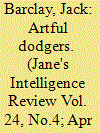

|
|
|
| 7 |
ID:
116678
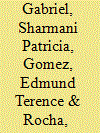

|
|
|
|
|
| Publication |
2012.
|
| Summary/Abstract |
Despite the significant level of cultural diversity that exists in contemporary Europe as a consequence of immigration and diaspora, state policies on multiculturalism in several countries have not kept pace with the complex and dynamic processes created by these pluralising social forces and realities. This has given rise to exclusionary contexts that have led to feelings of alienation by immigrant communities. In Britain, the violent street confrontations in Bradford in 2001 and the London bombings of 2005 both epitomised, as well as were outcomes of, the British nation state's failure to foster dialogue and a sense of inclusion among these communities. Foregrounding the extent of the grievances and frustrations prevalent in British society, these social disturbances have also contributed to renewed debates on issues of national identity, belonging, and multiculturalism. More importantly, these clashes, involving mostly the second-generation British Asian Muslim community, have brought to the fore the dissonance between assumptions of belonging underlying "state multiculturalism", which moves to fix and stabilise identities, and those that inform the complex processes of identification and constructions of the "third space" of belonging by racialised minority communities. Focusing on Britain, this paper's central hypothesis is that official multiculturalism has failed to take into account the fluid and heterogeneous frames in and through which second-generation British Asians ground their cultural and political identities and demands. As many of the nation states in Europe are today, like Britain, multiethnic in composition with expanding Asian communities, how successfully or not Britain modifies its integration policies with respect to the presence of minorities of immigrant origin has enormous implications not only for Europe but also for Asia and Asia-Europe relations.
|
|
|
|
|
|
|
|
|
|
|
|
|
|
|
|
| 8 |
ID:
098648
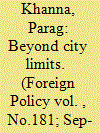

|
|
|
| 9 |
ID:
123888
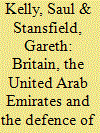

|
|
|
|
|
| Publication |
2013.
|
| Summary/Abstract |
This article investigates the deepening of the UK's security and defence arrangements with the United Arab Emirates (UAE).
In recent years there has been a flurry of diplomatic activity indicating far closer engagement between London and Abu Dhabi. Rather than being an innovative initiative of the Cameron government, the interaction has deeper roots, with this article uncovering the importance of the relatively unknown Defence Cooperation Agreement (DCA) of 1996, signed by the Major government. Furthermore, the UK-UAE defence relationship is shown to have endured beyond the infamous UK withdrawal from 'east of Suez' in 1971.
The current engagement is, however, more intense and potentially far-reaching than it had been in recent decades, with the defence sector being placed at the forefront of UK efforts to bolster the relationship with the oil-rich Gulf emirate.
Using official statements from London and Abu Dhabi, this article suggests that the UK-UAE relationship has always remained intact, although it lost focus following the end of the Major government until the refocusing on the Gulf by the Cameron government. The article concludes with an assessment of the expectations of the UAE, and the strategic drivers underpinning UK policy.
|
|
|
|
|
|
|
|
|
|
|
|
|
|
|
|
| 10 |
ID:
086559
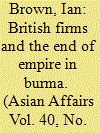

|
|
|
|
|
| Publication |
2009.
|
| Summary/Abstract |
A detailed examination of the war-time discussions within the British government and between government and the private sector over the direction of Burma's post-war economic reconstruction and the conditions under which companies might return. Through the focus on capital and commerce, the author seeks to explore British understandings-and misunderstandings- in their broadest sense.
|
|
|
|
|
|
|
|
|
|
|
|
|
|
|
|
| 11 |
ID:
130682
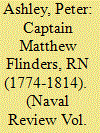

|
|
|
| 12 |
ID:
162053
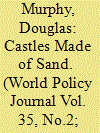

|
|
|
| 13 |
ID:
127236
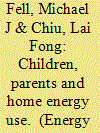

|
|
|
|
|
| Publication |
2014.
|
| Summary/Abstract |
While almost 30% of UK households include children, little research has attempted to present children's perspectives on home energy use. This study used focus groups with children and parents at two primary (elementary) schools in London, UK, to explore home energy use and energy feedback. Energy was found to be a little-discussed subject at home. Children derived more motivation to save energy from responsibility conferred by school activities than other (e.g. environmental) concerns, and some connected energy saving with dangers of using electricity (e.g. fire). Material and social constraints (e.g. access to outside space, parents' environmental attitudes) meant that it was sometimes difficult for children to save energy even when motivated. However, parents showed greater inclination to pay attention to energy saving when framed as supporting their child's learning than as a financial or environmental concern. Children were disinclined to reduce energy-consuming activities such as watching television, and while parents complained about children's energy use most saw it as a low priority issue. Policy implications of these findings are considered, and the approach employed is argued to be an effective way of investigating children's perceptions around energy use.
|
|
|
|
|
|
|
|
|
|
|
|
|
|
|
|
| 14 |
ID:
132342
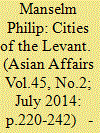

|
|
|
|
|
| Publication |
2014.
|
| Summary/Abstract |
Global cities are almost by definition somewhat detached from their geographical hinterlands. Cosmopolitan and modern, they are open to external influences from other cultures and from overseas trade. But they are also vulnerable to the rise of nationalism in the country which surrounds them, as is shown by the fate of three famous cities of the Levant, Alexandria, Smyrna and Beirut. They were multicultural trading cities, linking the economies of Europe and Asia, "windows on the world", in contrast to inland capitals like Cairo Ankara and Damascus. New global cities like London, Hong Kong and Dubai also have hybrid and polyglot inhabitants, like Levantine cities of bygone days. But they will need support if their cosmopolitanism is to prevail over nationalism.
|
|
|
|
|
|
|
|
|
|
|
|
|
|
|
|
| 15 |
ID:
117353
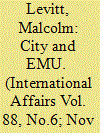

|
|
|
|
|
| Publication |
2012.
|
| Summary/Abstract |
This article examines four elements of City of London thinking related to Economic and Monetary Union (EMU) and European financial regulation, and includes previously unpublished material.
City opinion on EMU and prospective UK membership has been divided. Sceptics have rightly stressed the risks facing a monetary union of disparate economies without a robust fiscal framework, but naively believed that threats to the City from EMU members could not arise because of the rules of the single market. Enthusiasts wilfully neglected the economic risks but emphasized the regulatory threats to City competitiveness if the UK were outside. The UK regulatory philosophy stressing freedom for cross-border competition and light regulation of financial markets was never accepted by many continental member states, numerous impediments to competition persisted and potentially damaging attempts were made to exclude the City from key financial and legal provisions on the grounds that the UK was not participating in EMU. Being at the negotiating table averted those threats, but now goodwill has levelled off and the liberal regulatory philosophy is in retreat. Despite reservations about EMU, City institutions made crucial but little-known contributions to the practical implementation of the euro, stressing the scale and nature of the tasks of converting banking IT systems, the logistics of changing notes and coins and the need for legal certainty. They helped to persuade the European Commission to accept the phased introduction of the euro and the legal framework.
Now EMU faces an existential threat and the financial system faces more regulation at EU and UK levels. The position taken by the UK at the December 2011 European Council, ostensibly defending the City but risking marginalization, dismayed many City figures who would be more willing to compromise to preserve access to the single market-but Eurosceptic hedge funds, the least regulated financial sector, retain considerable lobbying power.
|
|
|
|
|
|
|
|
|
|
|
|
|
|
|
|
| 16 |
ID:
123189
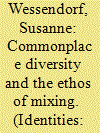

|
|
|
|
|
| Publication |
2013.
|
| Summary/Abstract |
The London Borough of Hackney is one of the most diverse places in Britain. It is characterised by a multiplicity of ethnic minorities, different migration histories, religions, educational and economic backgrounds both among long-term residents and newcomers. This article describes attitudes towards diversity in such a 'super-diverse' context. It develops the notion of 'commonplace diversity', referring to cultural diversity being experienced as a normal part of social life. While many people mix across cultural differences in public and associational space, this is rarely translated into private relations. However, this is not perceived as a problem, as long as people adhere to a tacit 'ethos of mixing'. This comes to the fore in relation to groups who are blamed to 'not want to mix' in public and associational space. The article discusses the fine balance between acceptable and unacceptable social divisions in relation to specific groups who are seen to lead separate lives.
|
|
|
|
|
|
|
|
|
|
|
|
|
|
|
|
| 17 |
ID:
107085
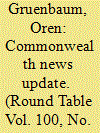

|
|
|
|
|
| Publication |
2011.
|
| Summary/Abstract |
Britain's worst riots since the 1980s erupted in London and other cities; 10,000 extra police went on to the streets but it was three days before order was restored. India's preparations for the 2010 Commonwealth games were plagued by corruption and 15 times over-budget, auditors found. The Islamist militant group Boko Haram targeted the UN in Nigeria with a suicide bomb. The anti-corruption campaigner Anna Hazare won increasing support in his stand-off with the Indian government. A state of emergency was declared in Trinidad after a spate of drug-related murders. The Gambia's suppression of the media intensified with seven people facing the death penalty for distributing T-shirts criticising President Jammeh.
|
|
|
|
|
|
|
|
|
|
|
|
|
|
|
|
| 18 |
ID:
104761
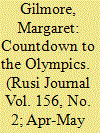

|
|
|
|
|
| Publication |
2011.
|
| Summary/Abstract |
In one sense, the London Olympic Games are already under attack: dozens of suspected fraudsters were arrested as tickets went on sale on 15 March 2011. But there are other major risks identified, including terrorism. Now, as construction of the venues nears completion and security plans move towards the operational stage, Margaret Gilmore interviews the key players in the efforts to secure the event, and assesses the risks to the Games and the security arrangements being put in place to counter them.
|
|
|
|
|
|
|
|
|
|
|
|
|
|
|
|
| 19 |
ID:
094082
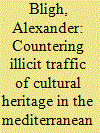

|
|
|
|
|
| Publication |
2010.
|
| Summary/Abstract |
Some of the most thrilling movies of all time depict imaginary or real thefts of artifacts from well-known museums. Topkapi (1964) is about the theft of the Ottoman Sultan's jewel-encrusted dagger from the Istanbul Museum; Entrapment (1999) is about the world's greatest art thief and his plans for the theft of a highly secured piece of artwork. More realistically, most people tend to turn to a news report on art stolen or recovered before they read their usual daily dose of hard news. Art and artifacts definitely capture the collective imagination. Art is usually viewed as the better dimension of human personality, while art thieves often enjoy a degree of infamy not usually associated with other kinds of felonies.
|
|
|
|
|
|
|
|
|
|
|
|
|
|
|
|
| 20 |
ID:
093758
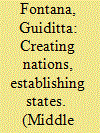

|
|
|
|
|
| Publication |
2010.
|
| Summary/Abstract |
This article explores the creation of modern Iraq in the period between the Armistice of Mudros in October 1918, marking the end of the First World War in the Middle East, and the conclusion of a formal peace treaty with Turkey in 1923. It looks at how far the British occupiers considered the ethno-religious character of the population while defining frontiers and political system in the territory, focusing on the three major ethno-religious groups in Iraq: Shia Arabs, Sunni Arabs and Kurds. It shows that British policy, influenced by the state of Anglo-Turkish relations, the relationship between officials in London and officials in Baghdad, and British economic necessities and public sentiments towards imperialism, evolved through three main phases: progressively, ethnic and religious factors receded in significance.
|
|
|
|
|
|
|
|
|
|
|
|
|
|
|
|
|
|
|
|
|